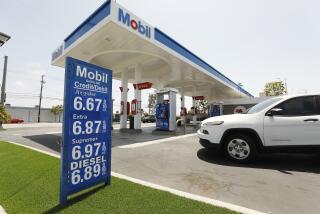Energy Chief Says Gas Supply Stable, May Boost Oil Reserve
- Share via
WASHINGTON — Energy Secretary Spencer Abraham declared Thursday that U.S. gasoline and oil supplies are “strong and stable” and that gas station operators who raised pump prices after the Sept. 11 terrorist attacks may be reprimanded by him personally.
“If necessary, I’ll get on the phone myself and make sure people understand that we’re not going to tolerate people trying to take advantage of consumers,” Abraham said.
The United States has about 540 million barrels of oil in its strategic reserve, which the government can tap to ease severe supply disruptions. Abraham said a proposal to add about 100 million barrels, while prices are near two-year lows, is under “very serious consideration.”
Before the terrorist attacks--which have led to sharp reductions in air travel and thus fuel usage--the U.S. was consuming nearly 20 million barrels of oil a day.
Even as demand for oil products dwindled in the days after the attacks, there were scattered reports of gas stations charging as much as $5 a gallon. Many Americans--particularly in the Midwest--rushed to the pumps, fearful of a fuel shortage.
“There is really no reason to top off tanks, to panic-buy or to accumulate reserves at home,” said Robert L. Darbelnet, president of AAA, the automobile association. “These very behaviors are not only unnecessary but could be dangerous.”
Gasoline prices should remain stable, he said, given plentiful supplies and the reaffirmation Thursday by the Organization of Petroleum Exporting Countries to maintain current production levels, which was expected.
In holding the line on production--and pledging instead to do a better job of sticking to earlier announced production quotas--the cartel hopes to stabilize prices without squeezing supplies so much that the global economy would head into recession.
Oil prices in London and New York have plummeted nearly 20% in response to traders’ fears of continued lower demand. West Texas intermediate crude, the U.S. benchmark, closed 36 cents higher at $22.74 a barrel on the New York Mercantile Exchange, marking a second day of recovery from prices that briefly touched two-year lows.
But for American consumers, the abiding concern is what happens at the gas pump.
Government investigations showed that supplies did not dwindle after the terrorist attacks, and station operators who raised prices were unjustified in doing so, Abraham said.
Subsequent price surveys conducted by respected industry monitors and the Energy Department’s own research arm found no evidence of widespread gouging.
Nevertheless, energy officials said, the department’s gas price hotline received thousands of calls from motorists complaining of high-priced stations, many of which were small chains in the Midwest.
The national average price for self-serve regular gasoline has fallen by 4.5 cents since Sept. 11 to $1.488 a gallon, according to AAA. Abraham said many of the stations that raised their prices after the attacks have since lowered them.
*
Times staff writer Nancy Rivera Brooks in Los Angeles contributed to this report.
More to Read
Sign up for Essential California
The most important California stories and recommendations in your inbox every morning.
You may occasionally receive promotional content from the Los Angeles Times.













